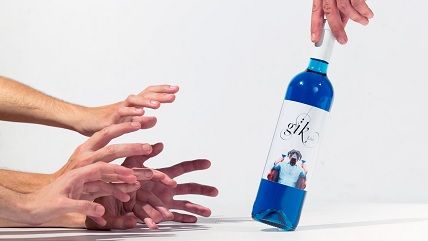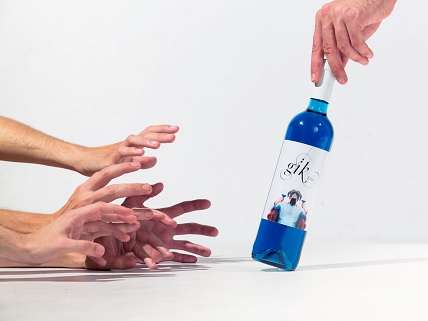Makers of Blue Wine Thwarted by EU Regulations
EU wine rules consider anything not authorized specifically to be illegal.


A group of young entrepreneurs from the Basque region of Spain who launched a new kind of blue wine in 2015 is now facing resistance from national and supranational bureaucrats. An anonymous complaint that the Spanish Wine Federation, which represents three-fourths of the country's wine producers, insists it did not file yielded a fine from Spain's agriculture ministry for violating wine regulations. The company that produces the blue wine, Gïk, has relabeled its product and added 1 percent grape must to avoid being considered a "pure wine."
"Under the European Union's oenological regulations," The New York Times explains, "whatever is not specifically authorized is considered illegal—and blue is not an approved color." Gïk has sold more than 120,000 bottles, with half being sold outside the EU, according to The Times. The young entrepreneurs who created the company had no background in winemaking, so they recruited a team of chemical engineers from University of Basque Country to develop the blue wine, which uses red and white grapes as well as a chemical from red grape skin and an organic food dye, indigotine, to achieve the blue color.
Taig Mac Carthy, one of the co-founders of Gïk, explained to The Times that they wanted to create something "more fun" for people who didn't particularly like "normal" wine. "The trouble is that we are trying to revolutionize an industry that has worked for centuries without making any change," Mac Carthy said, "and they control the rules of the game." The Spanish Wine Federation sees it differently. Their general-director told The Times that while they appreciated Gïk's initiative, "you have to respect the rules of the game, and they are for everybody."
"In Spain, wine is very linked to culture," Aritz López, another co-creator, told BBC last year. "It hasn't changed for centuries. This is a country that prefers tradition instead of innovation. But Gïk is trying to change that. We are for normal people that don't need to know thousands of rules in order to enjoy a glass."
Detailed rules on winemaking, however, are part of the EU's Common Agricultural Policy (CAP). Two-thirds of wine production worldwide occurs in EU countries, which are required to enforce laws in line with the CAP. Attempts by governments to control the rules of what constitutes what kind of alcohol aren't new, and in the case of the EU illustrate how the concept of the free movement of goods has been burdened by layer after layer of unnecessary regulation. If the Spanish Wine Federation, or any voluntary national (or even international association) would like to define wine or any other alcohol for their members, that's part and parcel of free, voluntary markets. Such rules should not be forced by government, and certainly should not be conflated with or made a condition for free trade and movement—consumers should have the freedom to decide for themselves.
Editor's Note: As of February 29, 2024, commenting privileges on reason.com posts are limited to Reason Plus subscribers. Past commenters are grandfathered in for a temporary period. Subscribe here to preserve your ability to comment. Your Reason Plus subscription also gives you an ad-free version of reason.com, along with full access to the digital edition and archives of Reason magazine. We request that comments be civil and on-topic. We do not moderate or assume any responsibility for comments, which are owned by the readers who post them. Comments do not represent the views of reason.com or Reason Foundation. We reserve the right to delete any comment and ban commenters for any reason at any time. Comments may only be edited within 5 minutes of posting. Report abuses.
Please to post comments


You kinda phoned in the alt-text there, Ed. But at least you have one. C-
Yeah, "Blue wine in Spain gets poured down the drain" would've been better.
In violet veritas.
"Under the European Union's oenological regulations," The New York Times explains, "whatever is not specifically authorized is considered illegal..."
Another reason to make the US more like the EU, I'm sure.
It's not a new observation. Not sure it's still the case, but when "grape tomatoes" were first introduced, the American marketplace had no problem with them, but the European marketplace could not sell them because there were no rules for grape tomatoes.
It's a radically different mindset, and I don't think progressives really know what they are asking when they demand we be more like Europe.
I'm not sure. I suspect there are a good number that do know what they're asking for.
yea most i know want government approval for everything...its depressing and unAmerican.
Juxtapose that statement with one from the NYT article last week about Uber, and their love of a permission based society is clear.
"At the time, Uber had just started its ride-hailing service in Portland without seeking permission from the city, which later declared the service illegal"
I'll never understand why progressives are infatuated with the EU. Germany's economy, the powerhouse of the EU, is roughly the size of West Virginia's?
Or 1.5x the size of California's. Same difference.
Hm. No hat tip?
This must be what life on a cotton plantation felt like.
"Not getting a hat tip is literally the same as being a slave, which is literally the same as getting deported" - Shikha, probably
I literally can't even.
"Swing low, sweet hat tip..."
This is a country that prefers tradition instead of innovation.
Um, the folks that bought the 60,000 bottles sold in the E.U. beg to differ. The "we need to ban this popular product because nobody wants it sold" meme wears thin.
+ Yogi Berra
I like the description of how they get it blue:
Nonsense, nonsense, nonsense.... blue food coloring.... nonsense, nonsense....
In other words, they took some cheap rose mix and put blue food coloring in it. I'm not sure how that's a big deal for regulators, but I'm also not sure why anyone should want to drink it.
Oh, and it isn't a "blue wine" any more than a Pinot Grigio with red food coloring in it is a red wine.
I'm not sure how that's a big deal for regulators
Yeah, I got how that works. It is just the least impressive part of the whole thing.
Calling something "glow wine" because you put fluorescent die in it isn't exactly revealing as to the character of the wine. Or terribly. honest. The "not important for regulators" bit is adding food coloring..... it should be perfectly safe to add an approved food die to any food product. I like my regulators to worry about safety.
But still, calling it a "blue wine" when it is clearly a cheap blended rose isn't really sufficiently descriptive. So I'm going to be on both sides on this one.
Regulators are dipshits because they are fining them for the wrong reason. And the makers are dipshits because they are being fundamentally dishonest calling this "blue wine" it is a white wine colored blue with blue food coloring. It is the same as putting green food coloring in beer and claiming that you brewed a green beer.
Plus they have the temerity to brag about bringing in chemical engineers to engineer the blue color. Really? You put blue food coloring in a white wine. Is that really advanced food science? My mother made green eggs and ham for her kids back in the 70's. Is that fancy food science, or judicious application of green food coloring?
So in summation, like all true libertarian takes on any topic: I declare them all idiots and us libertarians to be the true arbiters of all that is good and just and right in the world.
Oh, and just to pigeon hole myself into crank territory, I never understood red velvet cake either. Just take normal cake and add more food coloring than a lab rat should consume in a lifetime and somehow you are supposed to have a magically wonderful cake? Nah, I don't think so.
Real red velvet cake is a chocolate cake made with beets; the chemicals of which turns the chocolate red and imparts an earthy flavor. Ignore the boxed BS
Beets? No wonder I hate the stuff. Lots of good food come from the Deep South. Catfish with okra, alligator gumbo, Honey Boo Boo P'ghetti, ... but red velvet cake is an affront to my taste buds.
I have to eyeroll at the pretension. The makers are taking a childish gimmick and are pretending it is a revolutionary innovation. If you do not like wine, why would you like if it is colored blue?
Romulan ale at nerd parties?
I'm not sure how that's a big deal for regulators
The cares of regulators have naught to do with those of ordinary men, it is known.
Makers of Blue Wine-
Stop right there!
"Under the European Union's oenological regulations," The New York Times explains, "whatever is not specifically authorized is considered illegal?and blue is not an approved color."
That which is not mandatory is prohibited.
Shackford had one of the best rebuttals to this type of story that I have ever read on his Uber piece. If I may quote:
As usual when we see stories like this, the defense always seems to be "[fill in the blank] needs to follow the same rules as everybody else," and never "Everybody else should have the same freedom as [fill in the blank]." The story is written with an unquestioned assumption that extensive government regulation of private transit is normal and expected.
Beautiful.
That which is permitted is required, that which is not permitted is verboten.
Who the hell thinks you need to know 1000 rules to enjoy wine? If you like the way it tastes, drink it. If you don't like wine, drink something else.
Isn't this stuff just Boones Farm Blue Hawaiian? And while the EU is full of shit they might have a point on this one. No one should be subjected to drinking Boones Farm.
Love the colour of this wine and am glad wine makes are trying new things and innovating.
Love the colour of this wine and am glad wine makes are trying new things and innovating.